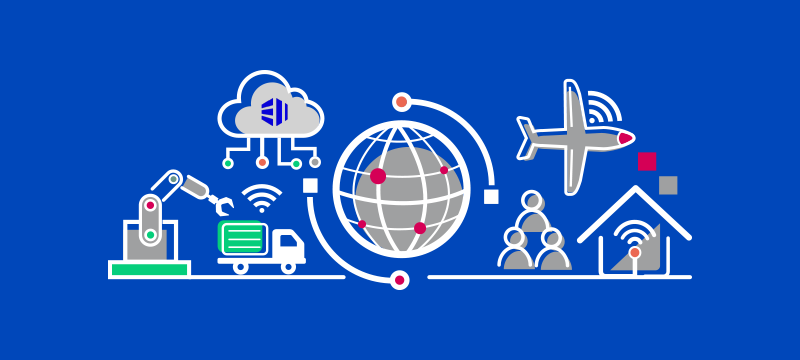The world is getting smarter. Every day, devices and technologies that were once standalone are getting connected to the internet. From robots to running shoes, these smart devices contain sensors that allow them to be monitored and controlled remotely and to gather large quantities of data. Collectively known as the Internet of Things (IoT) these devices are transforming modern business. Here, we’ll take a look at how.
What is IoT?
The IoT is a system that comprises the smart devices deployed by companies, together with the infrastructure and applications needed to connect, monitor and control them and to gather and analyse the data they generate.
In most cases, IoT systems are automated so that processes can be done with little or no human intervention. This often requires the use of cloud-based technologies, such as real-time analytics, artificial intelligence and machine learning. By adopting such technologies, highly complex operational processes can work smoothly while employee involvement can be radically reduced.
Today, IoT systems are used everywhere. Domestically, they are used by consumers to manage their homes: controlling lighting, heating, security cameras, etc., via their phones and smart speakers. Businesses and other organisations use them for a much wider range of purposes: logistics management, server monitoring, remote automation, personalisation, energy management, remote workforce monitoring and much more.
Here are some of the main ways the IoT is having an impact.
Inventory management
Inventory management is traditionally a time-consuming, labour-intensive process. The complexities of managing inventory mean data is rarely accurate or up-to-date and this often causes difficulties with procurement and order fulfilment.
Today, goods are labelled with RFID or Bluetooth tags and these are scanned automatically by IoT-connected scanners on entry to and exit from the warehouse and during transit. The scanners don’t just calculate stock levels, they also record the item’s location (making it easier to deploy warehouse robots, like Amazon) and the dates and times of movement.
Companies which use this technology always have accurate, real-time data about stock levels and can quickly find products in the warehouse. What’s more, the system can report issues with stock shortages, shelf-life, temperature control, travel delays and even flag potential theft from staff. On top of this, the company can be notified which stock items are in short supply and those which aren’t being sold, helping them make better decisions about procurement, product choice and pricing while ensuring that accurate fulfilment details are available.
Customer experience
The customer experience is a critical element of the modern marketing strategy, with companies going all out to satisfy the ever-increasing expectations of the consumer. Those that succeed benefit from enhanced brand loyalty and significantly increased customer lifetime value.
IoT plays a key role in enhancing the customer experience as devices are used to gather customer information from every available touchpoint. Data from mobile apps, social media interactions, home devices, customer communications, website browsing and sales histories are unified to glean insights that provide personalised customer experiences which meet the needs of the user.
Productivity
Sensors built into devices gather data that help companies drive up productivity in all areas. From production line processes to shipping delivery routes, operations and tasks can be completed quicker, more effectively and more cost-efficiently. Employee workloads are also reduced and the potential for automation is increased, enabling companies to reduce staffing levels or increase production.
Remote work and operations
IoT enables organisations to undertake remote working at levels previously inconceivable. An example which perhaps illustrates this best is the da Vinci robotic system, used by surgeons to carry out remote operations on patients. The surgeon views the patient in real-time while the connected robot holds the instruments and mimics their hand movements. Another advanced example is the real-time monitoring of aircraft engines during flight which enables specialised technicians to remotely deal with any issues that may arise.
On a less advanced level, IoT technology helps owners run their businesses or operations from anywhere in the world. During the lockdown, numerous companies have relied upon remotely connected devices to help employees work from home. Businesses that work on the go, such as plumbers, electricians, broadband installers, delivery drivers, etc., have been using IoT devices for a long time, helping them maintain schedules, track productivity, order and collect equipment and parts, obtain customer signatures and so forth.
Data-driven insights
IoT technology enables far more data to be gathered. That data can be analysed using advanced analytics programs, together with AI and machine learning, to provide previously unobtainable insights into the business. These can be used to improve efficiency, productivity, marketing and communications strategies; to predict market movements and forecast supply and demand; and to monitor machine health and improve security. When data is gathered from devices used by customers, the insights can be used to develop better products, offer better services and better meet the customer’s needs and expectations.
Conclusion
With so many connected devices for businesses to deploy, and with the infrastructure needed to make use of the IoT readily available in the cloud, IoT adoption is becoming increasingly popular amongst the business community. Its potential to bring improvements across so many areas of business operations is making it a technology hard for business owners to ignore, regardless of the industry they work in.
For information about our cloud hosting solutions, visit our cloud hosting or enterprise hosting pages.



